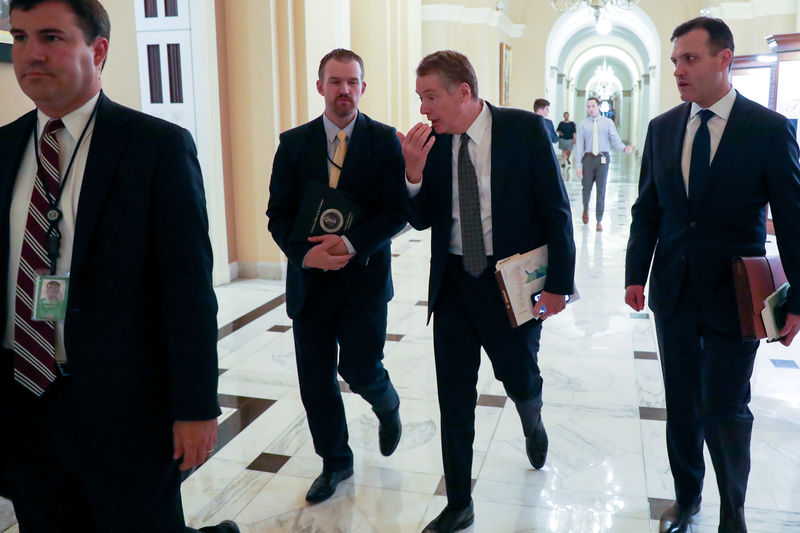By David Shepardson
WASHINGTON (Reuters) - President Donald Trump on Friday declared that some imported vehicles and parts pose a national security threat but delayed a decision for as long as six months on whether to impose tariffs to allow for more time for trade talks with the European Union and Japan.
The unprecedented designation of foreign vehicles imported to the United States from some of its closest allies sparked anger from automakers, dealers and foreign governments after a White House document hinted it would seek voluntary export quotas on autos from U.S. trading partners.
European Trade Commissioner Cecilia Malmstroem said on Twitter that "we completely reject the notion that our car exports are a national security threat. The EU is prepared to negotiate a limited trade agreement (including) cars, but not WTO-illegal managed trade."
World Trade Organization rules bar voluntary export restraints and the EU has repeatedly said it would not agree to any quotas on auto exports.
Trump's decision, at least for now, averts what was shaping up to be a new dramatic escalation in the Trump administration's trade disputes around the world, including a trade war with China.
The president had faced a Saturday deadline to make a decision on recommendations by the Commerce Department to protect the U.S. auto industry from imports on national security grounds and imposing tariffs of up to 25 percent.
Trump directed U.S. Trade Representative Robert Lighthizer to pursue negotiations with the EU, Japan and any other country he deemed appropriate and report back within 180 days. If no deal is reached, Trump will decide by then "whether and what further action needs to be taken."
In a proclamation released Friday, Trump agreed with a Commerce Department study that found some imported cars and trucks are "weakening our internal economy" and threaten to harm national security, but it stopped short of naming specific vehicles or parts.
Automakers warned the tariffs cost hundreds of thousands of auto jobs, dramatically raise prices on vehicles and threaten industry spending on self-driving cars.
A group representing major German and Asian automakers including Daimler AG (DE:DAIGn), Toyota Motor Corp, Volkswagen (DE:VOWG_p) AG, Honda Motor Co and Nissan Motor Co, called the suggestion some auto imports are a national security risk "absurd."
The group added that "no one in the industry has asked for tariffs or other ‘protection’ from the government."
"The truth stands: imported autos and auto parts are simply not a national security threat," said Cody Lusk, president of the American International Automobile Dealers Association. "Using this spurious claim as justification to force our trading partners into new negotiations will only create more uncertainty for America's entire auto industry."
The Alliance of Automobile Manufacturers, a trade group representing General Motors Co (NYSE:GM), VW, Toyota and others, said the companies remained "deeply concerned that the administration continues to consider imposing auto tariffs."
The group said that since 2017 automakers have invested $22.8 billion in new and existing facilities in the United States, but "increased auto tariffs threaten to undo this economic progress. At the end of the day, you can have tariffs or investment, but you can't have both."
Senator Ron Wyden, a Democrat, criticized Trump's finding and said his "petulant threats will only make it less likely our allies will work with us to confront our collective challenges with China and to fix real trade problems."
A revised U.S. trade deal with Mexico and Canada signed in November effectively shields existing imports from the two nations to the United States from national security tariffs.
The auto tariffs face strong opposition in Congress, including from many prominent Republicans. The White House has refused to release the auto import study to Congress.
Trump's proclamation said "domestic conditions of competition must be improved by reducing imports" and said a strong U.S. auto sector is vital to U.S. military superiority.
The reports cited statistics that U.S.-owned companies' share of the U.S. automobile market has declined from 67 percent, or 10.5 million units produced and sold in the United States, in 1985, to 22 percent, or 3.7 million units produced and sold in the United States, in 2017.
At the same time, the Commerce Department report stated that imports nearly doubled - from 4.6 million units to 8.3 million units.
U.S. Commerce Secretary Wilbur Ross told Trump that "successful negotiations could allow American-owned automobile producers to achieve long-term economic viability and increase R&D (research and development) spending to develop cutting-edge technologies that are critical to the defense industry."
The report called the European Union and Japan "protected foreign markets" that "impose significant barriers to automotive imports from the United States, severely disadvantaging American-owned producers."
The United States also has barriers to imports, most notably a 25 percent tariff on pickup trucks from outside North America.
